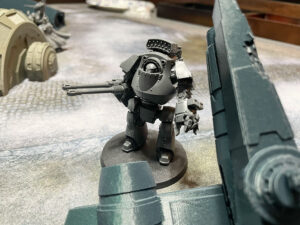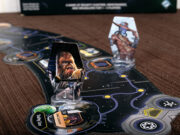 Horus Heresy: Age of Darkness is the massive starter box from Games Workshop to kick off the second edition of Warhammer, the Horus Heresy. The Horus Heresy game takes place in a setting 10,000 years before Warhammer 40k. Space marine has turned on space marine as the different chapters battle for Horus or for the Emperor of mankind. This box contains the core rules, 54 miniatures, and all the accessories you need to start playing in the grim dark world of Horus Heresy.
Horus Heresy: Age of Darkness is the massive starter box from Games Workshop to kick off the second edition of Warhammer, the Horus Heresy. The Horus Heresy game takes place in a setting 10,000 years before Warhammer 40k. Space marine has turned on space marine as the different chapters battle for Horus or for the Emperor of mankind. This box contains the core rules, 54 miniatures, and all the accessories you need to start playing in the grim dark world of Horus Heresy.
Gameplay Overview:
Horus Heresy sees two players selecting their armies and mission—and battling using space marines, psykers, and massive vehicles. Depending on the scenario, mission objectives change as well as deployment zones. After each player has deployed their army and the first player is selected the game continues for a set number of turns, until a timer limit is reached, or the mission objective is complete.

Each player gets a turn being the active player during each Game Turn. Each player’s turn is broken down into phases where they move, shoot, and assault. During each of these phases, the reactive players have reactions they can issue to their units to have them interact with the active player’s units.
Units are made up of a series of models that can be equipped with a large array of weapons for additional points cost. Different weapons on different models will provide that unit with flexibility and extra power on the battlefield. This includes vehicles that can have anything from anti-personal weapons to massive main guns that can punch through enemy vehicles. Also included in this box are measuring sticks and blast radius templates. Weapons on different units have different effective ranges, and some weapons fire ammo that explodes on impact where the blast radius templates come into play. This can cause swaths of damage on the battlefield and sometimes even cause units to scatter making them must regroup and become less effective on the field.
Players will take turns moving their troops and vehicles into position, utilizing cover where necessary. Then units are allowed to shoot with their equipped weapons. Finally, units that have closed distance with the enemy are allowed to charge and begin melee combat. Sometimes this results in the defending player being routed from the area and losing additional models.
Once players complete different objectives such as destroying a certain number of enemy forces or holding certain areas, the game will come to an end.

Game Experience:
There is a lot to talk about with the new Horus Heresy box. The quality of the components is top notch, as expected from a Games Workshop core set box. The models fit together well and were easy to put together, but there was almost an overwhelming amount of customization, where I found myself wondering if what I built would affect my gaming experience. The build instructions though were terrible, with sprues being referenced that weren’t labeled and unclear build pictures that left a lot to be desired.

If you have played any of Games Workshops’ other war games, you can pick up on minutia of the rules quickly. Overall though the turn structures and basics are very approachable. A lot of newer wargamers might get lost is in the rules for weapons, keywords, vehicle damage, and combat. While this all adds to the thematic battle occurring on the field, we found ourselves constantly referencing rules that weren’t on our reference sheets but living in the core rule book. Though to the credit of Games Workshop, what they did fit on the reference sheet is phenomenal and allowed us to keep play flowing for our hit and wound rolls.
The different models in the box let us split up our forces with a different general and vehicle each, along with assault marines, and basic infantry marines with bolters. While moving around the battlefield, I realized how important of a role that cover was going to play. Keeping my marines in cover (and in their armored transport) before I wanted to move out and shoot helped me cover a lot of ground.

Something we noticed playing was that whether it was our turn or not, we were interacting heavily with each other. The action/reaction rules had us constantly examining how we could capitalize on what our opponent was doing even if it wasn’t our respective turn. I found myself returning fire and evading as well as withdrawing. It didn’t feel like the game was as static as some other wargames I have played, and that is definitely a huge boon.
Once my armored transport was in the open, we got to experience vehicle combat including ramming and running over infantry and vehicle damage. While it didn’t explode it was still immobilized on the battlefield.
One mechanic we really enjoyed was the idea of snap shots when models couldn’t stand and fire. It felt more chaotic on the battlefield and realistic as our units were moving, they couldn’t take a steady shot, but sometimes they got lucky pulling the trigger while moving around cover.

Final Thoughts:
Overall, the Horus Heresy Age of Darkness starter box has everything you need to start getting some engaging games in the 31st millennium. This is only the first stepping stone with additional rules being added into the mix once you choose different space marine legions to play as. While our games took a while, we did have fun and felt that the forces we played out of the box were generally balanced.
The best part about this new edition of Horus Heresy is how thematic things felt and how we were always trying to think on our toes, even if it wasn’t our turn. A lot of wargames fail in that regard and feel like sometimes you can get a coffee while your opponent is moving their models. Horus Heresy corrects that problem with the action and reactions. This set (and rules set) are great for experienced wargamers, but I would be warry introducing it to newer wargamers. While thematic, the rules are crunchy and require a lot of familiarity to feel comfortable. The value for the money is in this box, especially if you buy it just for yourself to start running it as a whole space marine chapter. Don’t miss this if you love the lore of the era of Horus Heresy.
Final Score: 4.5 Stars – A fresh take on the Horus Heresy with rules that feel reactive and some great looking models.
 Hits:
Hits:
• Rules feel reactive with both players taking actions during a turn.
• Thematic outcomes such as the results of charges, and vehicle damage add a lot of flavor.
• Turn sequence is easy to understand and unit data sheets are easy to read.
• Massive value for the cost of the box.
Misses:
• Lots of keywords, rules, and tables to look up.
• Can feel very overwhelming to newer wargames.























Love your knowledge George.